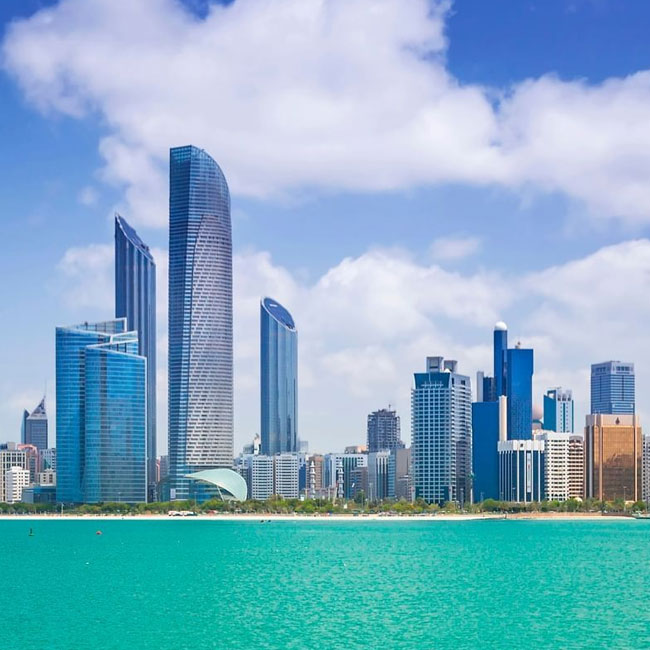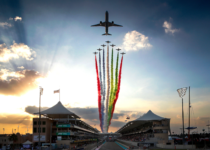The Department of Municipalities and Transport – Abu Dhabi announced today that slaughterhouses are fully prepared to receive the holy month of Ramadan and Eid Al Fitr, by taking several measures aimed at improving slaughterhouse services and ensuring their efficiency and readiness in Abu Dhabi, Al Ain and Al Dhafra regions. It urged the public to use the services of approved slaughterhouses, while warning against the dangers of random slaughter and dealing with itinerant butchers who use these services in order to maintain public health and safety.
The measures taken include organizing educational lectures for workers to enhance health and safety practices, carrying out the necessary maintenance of equipment and facilities in slaughterhouses, in addition to increasing the number of qualified workers inside slaughterhouses, especially professional butchers in Islamic slaughter practices, and veterinary teams dedicated to examining slaughtered animals before and after slaughter and ensuring the suitability of meat for consumption, in addition to activating general hygiene and sterilization procedures, including the proper disposal of waste and reducing its environmental impact.
The Department stresses the importance of taking such measures in slaughterhouses to ensure the quality of meat and its freedom from any epidemic diseases, and to ensure the safety of the public health of butchers, in addition to its importance in maintaining a clean and healthy environment, which is primarily reflected in the safety of community members as well as the beauty of the emirate and its general appearance.
The department explained that the four approved slaughterhouses in Abu Dhabi city include the automated slaughterhouse in the Abu Dhabi Port area, Bani Yas slaughterhouse, Al Shahama slaughterhouse, and Al Wathba slaughterhouse. These slaughterhouses extend their working hours to start from 6 am to 5 pm throughout the week, except for Fridays, when they are closed for Friday prayers from 11:30 am to 2 pm, ensuring that the slaughterhouses are able to effectively meet the needs of the public, as the expected capacity of these slaughterhouses during this period is more than 80,000 carcasses.
Eleven approved slaughterhouses in Al Ain are preparing to receive the public during the month of Ramadan and Eid Al Fitr, including the commercial slaughterhouse and the local slaughterhouse in Al Noud, Al Amerah slaughterhouse, and Suwaihan slaughterhouse, in addition to Al Hair slaughterhouse, Al Faqa slaughterhouse, and Al Waqan slaughterhouse, in addition to Al Qaw’ slaughterhouse, Al Salamat slaughterhouse, Masaken slaughterhouse, and Mufqar 1 slaughterhouse. The working hours in most of these slaughterhouses range from 7 am to 5:30 pm, throughout the week, and they close on Friday for prayers from 11 am to 2:30 pm, while the local slaughterhouse has approved the addition of an evening period starting at 8:00 pm and extending until 12:00 pm throughout the week and until 11:00 pm on Friday. The total capacity for the expected number of slaughtered animals during that period is more than 65 thousand.
Al Dhafra region is increasing the capacity of slaughterhouses there in preparation for the increase in demand during the holy month and Eid Al Fitr, so that the number of slaughtered animals expected to be prepared will exceed 10,000, through seven approved slaughterhouses, including the Madinat Zayed slaughterhouse, Liwa slaughterhouse, and Al Marfa slaughterhouse, in addition to the Ghayathi slaughterhouse, Al Sila slaughterhouse, and Dalma slaughterhouse, in addition to the first mobile slaughterhouse in Bidaa Al Mutawa, where the working hours in these slaughterhouses start from 8 am to 5 pm throughout the week, and they are closed on Fridays for prayers from 11 am to 2 pm.
The department also encourages the public in the emirate to benefit from the official electronic applications that were launched specifically to facilitate access to services and help solve the recurring congestion crisis in slaughterhouses, including the Dhabyati application, the Dhabyah Al Jazeera application, the Dhabyah Al Emarat application, and the Halal Mazari’na application, which in turn provide the ability to request and receive slaughtered animals by delivering them directly to the home in a more easy and fast way. It is also keen to provide the best services to senior citizens and people of determination, as it allows them to deliver animals, receive slaughtered animals, and pay fees while they are in their cars.
The Department of Municipalities and Transport warns members of society against resorting to illegal services provided by unlicensed butchers, and the negative health effects resulting from preparing slaughtered animals at home or in the streets, stressing that such practices expose them to legal accountability and financial fines.
The department also carries out inspection campaigns to monitor the performance of slaughterhouses and ensure their compliance with all environmental, health and occupational safety requirements, ensuring that Abu Dhabi slaughterhouses are more advanced and provide the best services with international specifications and strict health standards. This confirms its commitment to working to maintain health and safety for all, and is consistent with its strategy to improve the quality of life of community members in the Emirate of Abu Dhabi.







